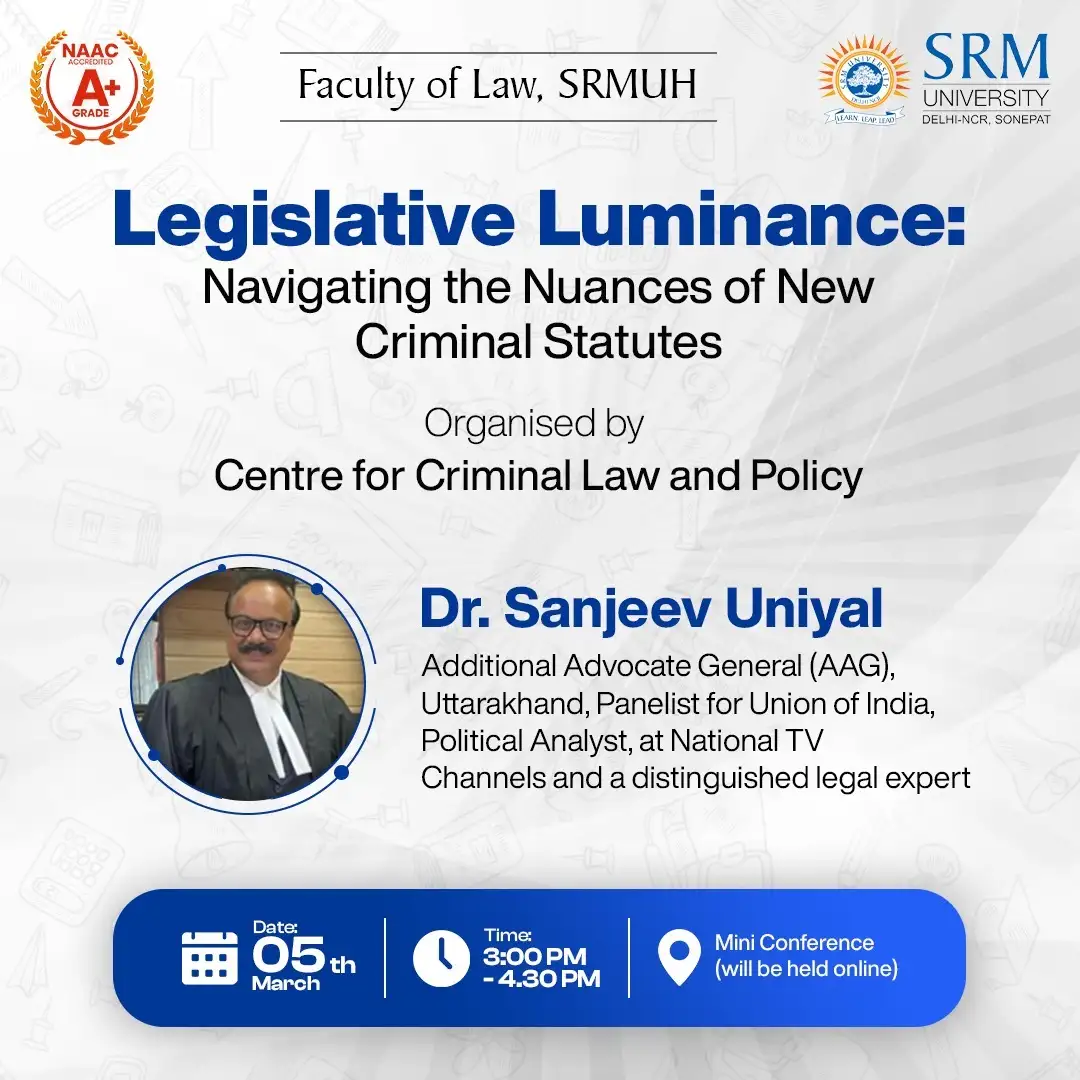The recent criminal law bills have garnered significant attention since their introduction in parliament and subsequent approval by the president of India. These bills are aimed at replacing colonial laws and are expected to bring about significant changes in the criminal justice system. In light of the ongoing discussions surrounding these bills, a guest lecture titled “Legislative Luminance: Navigating the Nuances of New Criminal Statutes” was organized by the Centre for Criminal Law and Policy (CCLP), a research center under the faculty of law at SRM University. This report highlights the main points discussed during the guest lecture, including its objectives, distinguished speakers, topics addressed, and the active participation of the audience.
Purpose of Guest Lecture:
The main objective of this guest lecture was to offer a comprehensive understanding of the fundamental element of the recent criminal statutes and their significance in the administration of criminal justice under Indian common law. Additionally, the purpose was to impart essential knowledge regarding the primary distinctions present in the criminal law bills when compared to the previous criminal Legislations.
Event details:
The lecture was conducted on March 5, 2024 from 3:00 to 4:30 pm. The guest lecture was hybrid in nature for the convenience of the resource person. In other words, it was hosted on Google meet and the participants attended the lecture at Conference room, Engineering Block. The resource person of the event was Dr. Sanjeev Uniyal, Additional Advocate General (AAG), Uttarakhand, Panelist for Union of India, Political Analyst and a distinguished legal expert. Mr. Poras Raj, (Assistant Prof.) faculty of law, very delightfully moderated the session, ensuring a smooth flow of information and interaction.
Session highlights:
Mr. Sanjeev delved into the importance of goals and reason with which these new laws were introduced and what changes and improvements the society may expect from the introduction of these new laws. The session shed light on the comparative analysis of Indian Penal Code, 1860 and Bharatiya Nyaya Sanhita, 2023 and key changes in the new criminal statute. The criticism attached with making of new criminal laws was discussed and what are key issues that are likely to arise, once the laws were made applicable. Some of the issues that were addressed are; Community service as form of punishment and do the new laws gave power too police too much so as to impose a more stringent form of state control.
Participation & Engagement:
The lecture has witnessed the enthusiasm of attendees that mainly comprised of the students eager to enhance their knowledge on the current issue and get a clarified perspective. The session was intriguing and interactive which allowed the attendees to ask questions to the resource person and actively engage with the speaker, further leading to a dynamic learning environment. The spokesperson also had interaction with the attendees during the session so as to make it interesting and not having a single flow of information but multiple opinions from different attendees.
Vote of thanks:
The session concluded with a heartfelt vote of thanks delivered by Dr. Sandeep Kulshrestha, Head of the department Faculty of law. He expressed his gratitude to the distinguished speaker, attendees and the organizing team for their collective effort in making the session intriguing and facilitating reciprocal communication between the resource person and the participants. Also, Dr. Sandeep Kulshrestha gave the concluding remarks highlighting the importance of the key take-a-ways from the session.
Conclusion:
The seminar discussing “Understanding the complexities of recent criminal legislation” was a significant addition in shedding light on the contentious topic of new criminal statutes and their impact on our criminal justice system. In the midst of our nation's progression towards globalization, we are faced with a myriad of challenges, such as the rise in criminal activities. It is imperative that we grasp the implications of the new criminal laws on our existing legal framework and anticipate the societal changes that may follow their enforcement.










